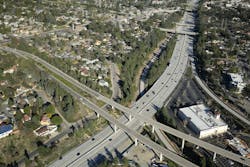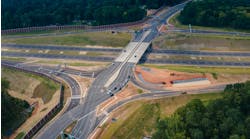Los Angeles’ congestion is notorious. Interstate-210 represents one route that required maintenance because of progressive deterioration.
This rehabilitation project took place on the very west part, where 210 ends at Interstate 5. Work extended to Wheatland Avenue, making the entire project span an approximately 9-mile stretch.
This four-year, $148.4 million project removed and replaced roughly 400,000 square yards of pavement slabs. This span of interstate is so massive that the project team worked on 16 bridges and used an in-house concrete batch plant on-site to create over 11 types of concrete.
Work was completed in 12 stages, with certain stages happening concurrently.
- Stage 1 – Westbound shoulder strengthening.
- Stage 2 – Median improvements.
- Stage 3 – Eastbound direction outside lanes from I-5 to State Route-118.
- Stage 4 – Eastbound outside from SR-118 to Wheatland Ave.
- Stage 5 – Eastbound rapid set concrete (RSC).
- Stage 6 – Eastbound on/off ramp closures.
- Stage 7 – Westbound Direction Outside Lanes from Wheatland Ave. to I-5.
- Stage 8 – Westbound RSC.
- Stage 9 – Westbound on/off ramp closures.
- Stage 10 – Westbound I-210 to southbound I-5 connector bridge railing.
- Stage 11 – Eastbound 210 to westbound SR-118 connector bridge railing.
- Stage 12 – Median concrete barrier.
The project team installed precast panels for approximately 11 lane miles to complete the project. They used 11 pavement type, including precast jointed plain concrete, two-lift composite pavement, and continuously reinforced concrete pavement.
During one phase of construction, crews installed 4,900 precast panels. This required minimizing traffic disruptions through the congested area. Through collaboration, the project team moved quickly to address the city’s concerns by using computerized message boards, traffic signal reprogramming, and construction zone speed limit enforcement.
Their efforts led to expedited ramp openings to reduce closure days from 45 to 30, with one ramp being closed and then reopened in just 13 days. The team attributes their successful coordination to the “escalation ladder” they developed in the early days of the project, which allowed them to resolve issues at the field level.
Strong collaboration also helped the team identify several changes that led to substantial savings in cost and time.
Early in the project, the team developed and approved a value engineering change proposal that reduced the overall depth of the new roadway’s depth from 2.25 feet to 1.95 feet. The move saved the project $768,804.
By Stage 7, a resequencing plan was needed to prevent cost and schedule impacts during the installation of temporary steel plates on the nine bridges throughout the project corridor. The finalized plan proposed a temporary-use traffic taper that enabled reordering traffic sections for construction of seven bridges in Stage 12 and two bridges in Stage 7 simultaneously. In the end, the plans stayed on course and the overall completion date was not impacted.
Flatiron also batched Portland Cement Concrete Pavement (PCCP) on-site using their in-house batch plant. A team placed PCCP under a complex management plan with multiple traffic handling stages and lane closures. This effort minimized impacts to the environment and project costs by eliminating the need for transit mix trucks for lean concrete base and delivering less material to the landfill.
Before the project was finished, Caltrans gave it three gold Success in Motion awards. The Success in Motion awards are given to Caltrans projects at the bronze, silver, and gold levels.
“Winning the Roads and Bridges Top 10 award makes me feel proud of all the hard work and effort we as a team put into the project, completing several challenging stages, and several 55-hour closures successfully. Knowing that the project was a success, this award gives me a great feeling, knowing that our hard work and efforts have paid off and are being recognized,” said Oscar Arellano, general superintendent of Flatiron west.
With the I-210 roadway rehabilitation project finished, this important stretch of roadway now has an extended pavement life of over 40 years, and enhanced safety in a dense urban area of Los Angeles County. RB
Project Name: Route 210 Roadway Rehabilitation
Project Location: Los Angeles
Owners: Caltrans
Designer: Caltrans
Contractors: Flatiron West, Inc.
Cost: $148.4M
Length: 9.7 miles
Completion Date: October 2023



